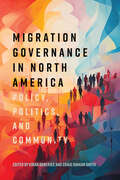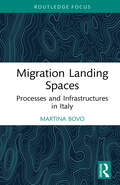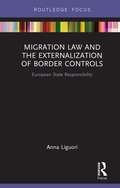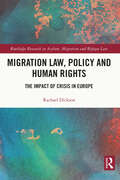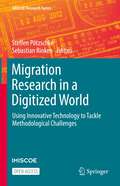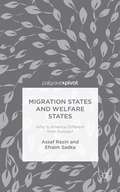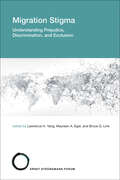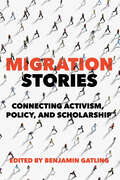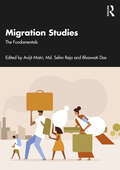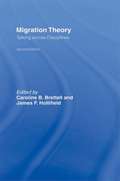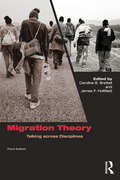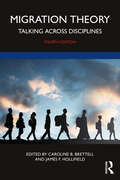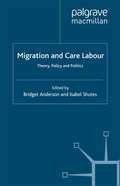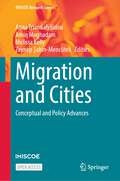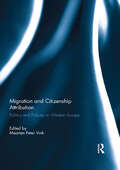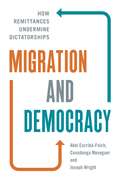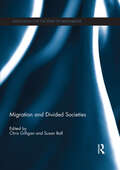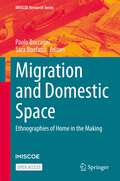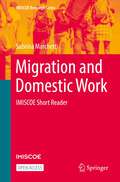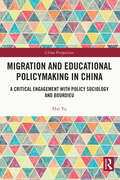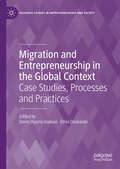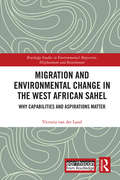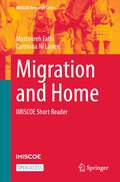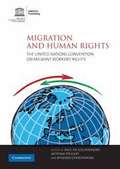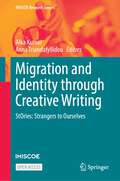- Table View
- List View
Migration Governance in North America: Policy, Politics, and Community (McGill-Queen's Refugee and Forced Migration Studies)
by Kiran Banerjee Craig Damian SmithMillions of people arrive in North America each year, including highly skilled immigrants and temporary workers, refugees, and international students. Migration, border control, and asylum are ongoing flashpoints in Canadian, American, and Mexican relations, and deeply affect the domestic politics and economies of each country.While migration has emerged as an only increasingly charged topic in public discourse, research has largely focused on North America’s lack of regional integration around mobility, often neglecting aspects of regional cooperation, hierarchy, and global engagement. Migration Governance in North America advances that conversation by examining the complex dynamics of mobilities across the continent through contemporary analysis and historical context. Situating North America within the global migration landscape, contributors from Canada, the United States, Mexico, and Europe unpack such issues as temporary labour mobility, border security, asylum governance, refugee resettlement, and the role of local actors and activists in coping with changing policies and politics.In the wake of a series of significant and likely enduring changes across the continent this flagship volume puts policy developments and migrant organizing in conversation across borders, investigates often contentious domestic, regional, and global migration politics, and reveals how intersecting policy frameworks affect the movement of people.
Migration Landing Spaces: Processes and Infrastructures in Italy (Routledge Studies in Development, Mobilities and Migration)
by Martina BovoThis book looks at migrant landing spaces, exploring the processes and infrastructures which people encounter as they navigate urban spaces along the central Mediterranean route.The book argues that there remains a theoretical and practical difficulty in grasping the complexity of migrant arrivals. Migrants are often unsure whether they will stay or leave, their mobility is uncertain. Despite this, they face rigid binaries and categories within administrative policy and planning which tries to pin them down as either permanent or temporary. Drawing on extensive original research in southern Italy, this book suggests that we should instead think of ‘landing spaces’: parts of the city that work as infrastructures for landing, that allow for an open and dynamic use of the urban space and provide opportunities for encounter and information exchange as migrants consider their next steps.Combining an ethnographic gaze with insights from urban planning, architecture, geography, social sciences and migration studies, this book invites us to look closer at the interactions between people, practices and places as migrants land in Europe.
Migration Law and the Externalization of Border Controls: European State Responsibility (Routledge Research in EU Law)
by Anna LiguoriOver the last few decades, both the European Union and European States have been implementing various strategies to externalize border controls with the declared intent of saving human lives and countering smuggling but with the actual end result of shifting borders, circumventing international obligations and ultimately preventing access to Europe. What has been principally deplored is the fact that externalizing border controls risks creating ‘legal black holes’. Furthermore, what is particularly worrying in the current European debate is the intensification of this practice by multiple arrangements with unsafe third countries, exposing migrants and asylum seekers to serious human rights violations. This book explores whether European States can succeed in shifting their responsibility onto Third States in cases of human rights violations. Focusing, in particular, on the 2017 Italy-Libya Memorandum of Understanding, the book investigates the possible basis for triggering the responsibility of outsourcing States. The second part of the book examines how the Italy-Libya MoU is only a small part of a broader scenario, exploring EU policies of externalization. A brief overview of the recent decisions of the EU Court vis-à-vis two aspects of externalization (the EU-Turkey statement and the issue of humanitarian visas) will pave the way for the conclusions since, in the author’s view, the current attitude of the Luxembourg Court confirms the importance of focusing on the responsibility of European States and the urgent need to investigate the possibility of bringing a claim against the outsourcing States before the Court of Strasbourg. Offering a new perspective on an extremely topical subject, this book will appeal to students, scholars and practitioners with an interest in European Law, International Law, Migration and Human Rights.
Migration Law, Policy and Human Rights: The Impact of Crisis in Europe (Routledge Research in Asylum, Migration and Refugee Law)
by Rachael DicksonMigration is one of the greatest societal challenges of our time. It has many facets, from mass movements to escape war, climate, or human rights abuses to the search for economic opportunity and prosperity. Illicit industries facilitate border crossings at the expense of safety, and governments face problems of processing and integrating new arrivals. These challenges have had a profound impact in Europe, calling into question central values of solidarity and human rights. This book analyses the law and policy of migration in the European Union (EU) and its relationship to understandings of the EU as an international human rights actor. It examines the role crisis plays in determining the priorities of migration policy and the impact political exigencies have on the rights of migrants. This book problematises the EU Area of Freedom, Security, and Justice as a ‘home.’ Taking a governmentality approach to critique discourse, the idea of a holistic approach is deconstructed to explore notions of wellness, resilience, responsibilisation and externalisaton. The EU’s pursuit of a holistic approach to managing migration in crisis indicates problems with EU solidarity, and the tactics employed to bring the crisis under control reveal security concerns that provoke questions about the EU as an international human rights actor. Both this framework for analysis and the empirical findings make a significant contribution to how the migration crisis can be theorised using adaptable conceptual tools. Under this form of governance, migration becomes a phenomenon to be treated so that its symptoms are ameliorated. This book will be of interest to students and scholars of the EU, migration, and human rights as well as policymakers, commentators, and activists in these areas.
Migration Research in a Digitized World: Using Innovative Technology to Tackle Methodological Challenges (IMISCOE Research Series)
by Steffen Pötzschke Sebastian RinkenThis open access book explores implications of the digital revolution for migration scholars’ methodological toolkit. New information and communication technologies hold considerable potential to improve the quality of migration research by originating previously non-viable solutions to a myriad of methodological challenges in this field of study. Combining cutting-edge migration scholarship and methodological expertise, the book addresses a range of crucial issues related to both researcher-designed data collections and the secondary use of “big data”, highlighting opportunities as well as challenges and limitations. A valuable source for students and scholars engaged in migration research, the book will also be of keen interest to policymakers.
Migration States And Welfare States: Why Is America Different From Europe?
by Efraim Sadka Assaf RazinMigration States and Welfare States focuses on a central tension faced by policy makers in countries that receive migrants from lower wage countries.
Migration Stigma: Understanding Prejudice, Discrimination, and Exclusion (Strüngmann Forum Reports #32)
by Lawrence Yang Maureen Eger Bruce LinkAn introduction to the concept of &“migration stigma,&” along with new analytical frameworks to deepen understanding of the experiences of immigrants, their descendants, and native-born residents in immigrant-receiving societies.Due to economic crises, sociopolitical instability, and climate change, international migration is likely to persist if not increase in the future. Meanwhile, struggles to secure widespread acceptance of immigrant populations are evident worldwide. This volume, edited by Lawrence Yang, Maureen Eger, and Bruce Link, introduces the concept of &“migration stigma&” and proposes new ways to understand the complex challenges facing immigrants, their descendants, and contemporary societies. Contributions reveal how migration stigma affects areas such as health, financial well-being, and social cohesion; analyze the multilevel and temporal processes underlying migration stigma; and propose social, economic, and policy frameworks to address its harmful consequences. Contributors Muna Adem, Drew Blasco, Andrea Bohman, Heide Castañeda, Christian S. Czymara, Joerg Dollmann, Maureen A. Eger, Tyrone A. Forman, Daniel Gabrielsson, San Juanita García, Anastasia Gorodzeisky, Mark L. Hatzenbuehler, Marc Helbling, Mikael Hjerm, Seth M. Holmes, Elisabeth Ivarsflaten, Tomás R. Jiménez, Irena Kogan, Christian Albrekt Larsen, Bruce G. Link, Rahsaan Maxwell, Supriya Misra, Dina Okamoto, John E. Pachankis, Nicolas Rüsch, Georg Schomerus, Patrick Simon, Anders Vassenden, Paolo Velásquez, Katie Wang, Markus Weißmann, Rima Wilkes, Lawrence H. Yang, Min Zhou
Migration Stories: Connecting Activism, Policy, and Scholarship (Studies of World Migrations)
by Benjamin GatlingMigrants’ and refugees’ stories have become an essential part of the public debate around immigration. Benjamin Gatling edits interdisciplinary essays that bring together the distinct perspectives of researchers, activists, and policymakers to emphasize how these often-siloed communities can use stories as social science data and advocacy tools. Ranging from oral history projects to the asylum process to calls for decolonial justice, the contributors’ analyses illuminate how migrants’ and refugees’ personal narratives influence both perceptions and policies. Their merger of perspectives provides a nuanced understanding of migration and emphasizes the importance of how storytelling can foster empathy, challenge stereotypes, and drive social change. At the same time, the essays center migrants’ and refugees’ voices within public debates and in work done to humanize the reality they face. Original and multifaceted, Migration Stories provides a vital addition to how we study and frame immigration.
Migration Studies: The Fundamentals
by Avijit Mistri Bhaswati Das Md. Selim RejaThis book is an essential toolkit for students and early researchers of population studies and demography, geography, economics, development studies political science, sociology, anthropology, and gender studies.The volume:- Presents in-depth coverage of basic concepts;- Includes empirical data, case studies, and references for further reading;- Covers critical aspects of migration studies ranging from the theoretical to contemporary issues and policies.The book will be of interest to scholars, students, researchers, or anyone interested in migration and diasporic studies, development studies, the politics of migration, immigration policy, social anthropology, economics, and sociology.
Migration Theory: Talking across Disciplines
by Caroline B. Brettell James F. HollifieldDuring the last decade the issue of migration has increased in global prominence and has caused controversy among the host countries around the world. Continuing their interdisciplinary approach, editors Catherine Brettell and James Hollifield have included revised essays from the first edition in such fields as anthropology, political science, and history. This edition also features new essays by a demographer, geopgrapher, and sociologist.
Migration Theory: Talking across Disciplines
by Caroline B. Brettell James F. HollifieldDuring the last decade the issue of migration has increased in global prominence and has caused controversy among the host countries around the world. Continuing their interdisciplinary approach, editors Catherine Brettell and James Hollifield have included revised essays from the first edition in such fields as anthropology, political science, and history. This edition also features new essays by a demographer, geopgrapher, and sociologist.
Migration Theory: Talking across Disciplines
by Caroline B. Brettell and James F. HollifieldThe revised fourth edition of Migration Theory continues to offer a one-stop synthesis of contemporary thought on migration. Editors Catherine B. Brettell and James F. Hollifield remain committed to include coverage that is comparative and global in scope while enhancing similarities and differences between one academic field and the next. All chapters have been revised to highlight cutting-edge issues in the field of migration studies today. The fourth edition welcomes two new authors, Professors Marie Price and François Héran, to offer a fresh approach with their chapters on geography and demography, respectively. Designed for undergraduate and graduate courses in migration studies, a primary goal of the text is to assist instructors in guiding students who may have little background on migration, to understand important issues and the scientific debates. This ensures Migration Theory is a highly valuable guide not only to the perspectives of one's own discipline but also to those of cognate fields.
Migration and Care Labour: Theory, Policy and Politics (Migration, Diasporas and Citizenship)
by B. Anderson I. ShutesThe provision of care has been widely referred to as facing a 'crisis'. International migrants are increasingly relied upon to provide care – as domestic workers, nannies, care assistants and nurses. This international volume examines the global construction of migrant care labour and how it manifests itself in different contexts.
Migration and Cities: Conceptual and Policy Advances (IMISCOE Research Series)
by Melissa Kelly Anna Triandafyllidou Zeynep Şahin-Mencütek Amin MoghadamThis open access book brings together different perspectives on migration and the city that are usually discussed separately, to show the special character of the urban context as a territorial and political space where people coexist, whether by choice or necessity. Drawing on heterogeneous situations in cities in different world regions (including Europe, North America, the Middle East, South, Southeast and East Asia and the Asia Pacific) contributions to this volume examine how migration and the urban context interact in the twenty-first century. The book is structured in four parts. The first looks at cities as hubs of cultural creativity, exploring the many dimensions of cultural diversity and identity as they are negotiated in the urban context. The second focuses on what lies outside the large urban centres of today, notably suburbs, while the third part engages with migration and diversity in small and mid-sized cities, many of which have adopted strategies to welcome growing numbers of migrants. Last but not least, the fourth part looks at the challenges and opportunities that asylum-seeking and irregular migration flows bring to cities. By providing a variety of empirical cases based on various world regions, this book is a valuable resource for researchers, students and policy makers.
Migration and Citizenship Attribution: Politics and Policies in Western Europe
by Maarten Peter VinkHow do states in Western Europe deal with the challenges of migration for citizenship? The legal relationship between a person and a state is becoming increasingly blurred in our mobile, transnational world. This volume deals with the membership dimension of citizenship, specifically the formal rules that states use to attribute citizenship. These nationally-specific rules determine how and under what conditions citizenship is attributed by states to individuals: how one can acquire formal citizenship status, but also how this status can be lost. Migration and Citizenship Attribution observes various trends in citizenship policies since the early 1980s, analysing historical patterns and recent changes across Western Europe as well as examining specific developments in individual countries. Authors explore the equal treatment of women and men with regard to descent-based citizenship attribution, along with the process of convergence between countries with ‘ius soli’ and ‘ius sanguinis’ traditions with regard to birthright provisions. They consider how the increasing acceptance of multiple citizenship is reflected in a dual trend to abolish, or at least to moderate, the renunciation of the citizenship of origin as a condition for naturalisation, and also to restrict provisions of loss of citizenship due to voluntary acquisition of a foreign citizenship. Another trend observed and discussed is the introduction by many countries of language tests and integration conditions in the naturalisation procedure, with some countries now concluding the naturalisation process by means of a US-styled citizenship ceremony. Contributors also explore the various things taken into account under state citizenship laws such as statelessness, or membership of the European Union.This book was originally published as a special issue of the Journal of Ethnic and Migration Studies.
Migration and Democracy: How Remittances Undermine Dictatorships
by Joseph Wright Abel Escribà-Folch Covadonga MeseguerHow remittances—money sent by workers back to their home countries—support democratic expansionIn the growing body of work on democracy, little attention has been paid to its links with migration. Migration and Democracy focuses on the effects of worker remittances—money sent by migrants back to their home countries—and how these resources shape political action in the Global South. Remittances are not only the largest source of foreign income in most autocratic countries, but also, in contrast to foreign aid or international investment, flow directly to citizens. As a result, they provide resources that make political opposition possible, and they decrease government dependency, undermining the patronage strategies underpinning authoritarianism.The authors discuss how international migration produces a decentralized flow of income that generally circumvents governments to reach citizens who act as democratizing agents. Documenting why dictatorships fall and how this process has changed in the last three decades, the authors show that remittances increase the likelihood of protest and reduce electoral support for authoritarian incumbents.Combining global macroanalysis with microdata and case studies of Senegal and Cambodia, Migration and Democracy demonstrates how remittances—and the movement of people from authoritarian nations to higher-income countries—foster democracy and its expansion.
Migration and Divided Societies (ISSN)
by Chris Gilligan Susan BallThe study of 'divided societies' has focused, historically, on either ethnic divides in colonial (or post-colonial) societies or on developed Western democracies which have ethnic power-sharing Government structures. The study of divided societies emerged historically at a moment when there was a growing interest in the study of immigration and inter-ethnic relations in developed industrial nations. These two sets of literature―on divided societies and on immigration and inter-ethnic relations―have developed largely in isolation from each other. Both sets of literature have also tended to focus on inter-ethnic relations, and have paid much less attention to migration. This edited collection sets out to fill this gap in the literature through examining migration and ethnic division. The case studies examined include developed industrial nations (Canada and Norway), a post-colonial country (Kenya) and three cases which feature regularly in the 'divided societies' literature (Bosnia, Northern Ireland and Israel). Taken together, these case-studies suggest ways in which migration intersects with and complicates ethnic divides in 'divided societies'. This book was published as a special issue of Ethnopolitics.
Migration and Domestic Space: Ethnographies of Home in the Making (IMISCOE Research Series)
by Paolo Boccagni Sara BonfantiThis open access book provides insight into the domestic space of people with an immigrant or refugee background. It selects and compares a whole spectrum of dwelling conditions with ethnographic material covering a variety of national backgrounds – Latin America, North and West Africa, Eastern Europe, South Asia – and an equally broad range of housing, household and legal arrangements. It provides a fine-grained understanding of migrants’ lived experience of their domestic space and shows the critical significance of the lived space of a house as a microcosm of societal constellations of identities, values and inequalities. The book enhances the connection between migration studies and research into housing, social reproduction, domesticity and material culture and provides an interesting read to scholars in migration studies, policy makers and practitioners with a remit in local housing and integration policies.“This wonderful edited collection extends our understanding of migration not only into the confines of the domestic space but also into the territory of the ethnographer. What does it mean to be a guest in a migrant home? This collection of chapters traverses this question in diverse settings and circumstances of homemaking […]. Boccagni and Bonfanti have skilfully created an intricate lace of ethnographic accounts that provides a nuanced understanding of the built environments where migrants live, how they relate to their homes and how this is articulated in their attitudes toward majority society. The chapters, each on its own and together as a collection, advance our understanding of the researcher being a guest in the migrant home, just like the migrant being a guest in the host country. This complexity of ethnography and positionality makes this edited book an essential reading for migration scholars and ethnographers alike!” Iris Levin, Lecturer in Urban Studies, RMIT University, Melbourne, Australia “This book demonstrates how ethnographies of home and dwelling can bear on the study of migration and its manifestation in domestic space. Entering someone’s home as a researcher challenges our ethical registers: the researcher moves between being a stranger and a guest. The authors point to the dilemmas researchers encounter in intimate settings and how they might be resolved. A valuable and timely book for researchers on dwelling, home and movement.” Cathrine Brun, Professor of Human Geography, Centre for Lebanese Studies, Oxford, UK "This excellent collection delves into the relationship between migration, domesticity, and material culture. It is ethnographically rich and impressively varied in its geographical scope, with insights that will prove extremely useful to scholars and practitioners alike. The great strength of the volume lies in the fascinating diversity, granular detail and methodological care of the contributions, with authors deploying concepts and arguments that prepare a great deal of fertile ground for future work." Tom Scott-Smith, Associate Professor of Refugee Studies and Forced Migration, University of Oxford “This insightful collection departs from the simple yet significant question of roles: What happens when the researcher/participant relationship, becomes guest/host instead? By seeing and interpreting domestic spaces as ethnographic field sites, the contributions shed light on refugees’ and other migrants’ lived experiences of home and housing. Drawing on empirical evidence from diverse types of homes, across geographic locations, Migration and domestic space: Ethnographies of home in the making offers valuable and fresh perspective, encouraging new connections between material and emotional, public and private, in migration research.” Marta Bivand Erdal, Research Professor in Migration studies, Peace Research Institute Oslo (PRIO).</
Migration and Domestic Work: IMISCOE Short Reader (IMISCOE Research Series)
by Sabrina MarchettiThis open access short reader offers a systematic overview of the scholarly debate on the experiences of migrant domestic workers at a global level, in the past as well as in present time. It tackles the nexus between migration and domestic work with a multi-layered approach. The book looks into the issue of (paid) domestic work in migratory contexts by investigating the feminization of migration, thereby considering the larger framework within which this specific phenomenon takes place. The author explains notions such as the “international division of reproductive labor” or “global care chains” which emphasize the inequality in the way care and domestic tasks are distributed today between middle-class women in receiving nations and migrant domestic workers. Moreover, the book shows how women migrating to work in the domestic work and private care sector are facing a complex landscape of migration and labor regulations that are extremely difficult to navigate. At the same time, this issue also addresses employers’ households who cannot find appropriate or affordable care among declining welfare states and national workers reluctant to take the job, whilst legal regulations make difficult to hire a domestic worker who is a third country national. As such this book offers an interesting read to academics, policy makers and all those working in the field.
Migration and Educational Policymaking in China: A Critical Engagement with Policy Sociology and Bourdieu (China Perspectives)
by Hui YuBy concentrating on the topic of school enrolment policy for rural-to-urban migrant children in China, this book analyses the unequal power relations and structural inequalities that can appear in the context of education. The author complements current knowledge by applying theoretical resources of policy sociology, in particular the thinking of Pierre Bourdieu, into analysis of educational policymaking in the Chinese context. He takes a policy trajectory approach to trace the (unequal) power relations and structural inequalities invested and realised in the school enrolment policy. Rooted in rich qualitative data from five metropolises, he examines both external influences of politics, economy and public policy on educational policy agenda setting and discursive practices within the educational policy cycle, inherent in the post-2013 restrictive school enrolment policy. Structural constraints and agency in the local context are also explored, indicating that the intersectional effects of political, economic, and civic logic can result in differentiated modes of policy enactment. The study will be of interest to scholars, students, policymakers and practitioners in helping address policymaking and social justice in education for migrants and other marginalised groups.
Migration and Entrepreneurship in the Global Context: Case Studies, Processes and Practices (Palgrave Studies in Entrepreneurship and Society)
by Denis Hyams-Ssekasi Eirini DaskalakiPresenting a collection of case studies on immigrant and migrant entrepreneurship, this book offers an understanding of the phenomenon as a creation of a distinctive labor market that leads to innovation, productivity, and economic growth. As such, it contributes to SDG 8: 'Promote sustained, inclusive and sustainable economic growth, full and productive employment and decent work for all.'Reflecting on the increasing interest in the subject, contributors provide new perspectives of migrants in diaspora, thus offering a better grasp of lived experiences. Chapters explore the common adversities that immigrant entrepreneurs face, such as the lack of knowledge in terms of operations of the host country market, dealing with unfair treatment, and the subsequent challenge of building long term relationships with locals. Focusing on individual migrant entrepreneurship cases and the recurrent challenges that such entrepreneurs encounter, many of the chapters are written by academics who are migrants with entrepreneurial experiences, which brings a unique insight into the topic. Exploring issues such as gender and enterprise, family business, and entrepreneurial activities, this distinctive collection provides a comprehensive overview of varied experiences of migrant entrepreneurs in both developed and developing countries.
Migration and Environmental Change in the West African Sahel: Why Capabilities and Aspirations Matter (Routledge Studies in Environmental Migration, Displacement and Resettlement)
by Victoria van der LandThe West African Sahel is predicted to be heavily affected by climate change in the future. Slow-onset environmental changes, such as increasing rainfall variability and rising temperature, are presumed to worsen the livelihood conditions and to increase the out-migration from the affected regions. Based on qualitative and quantitative data from study areas in Mali and Senegal, this book examines the relationship between population dynamics, livelihoods and environment in the Sahel region, focussing specifically on motives for migration. Critiquing the assumption that environmental stress is the dominating migration driver, the author demonstrates the important role of individual aspirations and social processes, such as educational opportunities and the pull of urban lifestyles. In doing so, the book provides a more nuanced picture of the environment-migration nexus, arguing that slow-onset environmental changes may actually be less important as drivers of migration in the Sahel than they are often depicted in the media and climate change literature. This is a valuable resource for academics and students of environmental sociology, migration and development studies.
Migration and Home: IMISCOE Short Reader (IMISCOE Research Series)
by Mastoureh Fathi Caitríona Ní LaoireThis open access short reader offers an intersectional perspective on the meaning of home in migration. The book provides a pathway through existing scholarship on home and migration, exploring how intersectional power relations and transnational migration regimes are felt, experienced, lived and navigated by migrants, who are differently positioned, in the making and imagining of home. The meanings associated with home are composed of the interrelation of places, spaces, people, social relations, materialities, emotions and temporalities. These multiple aspects highlight the complexities inherent in the idea of home, which come to the fore particularly when one moves location. Migration and Home explores these issues by focusing on specific key aspects of home in migration: home and gender; home and age; home and materiality; and home and migration status, class and race. It proposes the concept of structural im/possibilities as a framework for understanding the power relations and structures that shape where, when and for whom home in migration is more, or less, possible.
Migration and Human Rights
by Ryszard Cholewinski Paul De Guchteneire Antoine PécoudTwenty contributions from international academics and practitioners discuss the human rights implications of irregular migration in the EU from theoretical, European, and international perspectives. They analyze public perceptions of irregular migrants, assess the impact of immigration policies, and consider various ways of fostering integration. The papers were originally presented at a 2003 conference held at the U. of Leicester.
Migration and Identity through Creative Writing: StOries: Strangers to Ourselves (IMISCOE Research Series)
by Anna Triandafyllidou Alka KumarThis open access book brings together storytelling and self-narrative, creative writing and narrative enquiry to explore a variety of topics in migration from an experiential lens. The volume is hybrid and multi-genre as it contains both scholarly chapters grounded in academic perspectives, as well as personal essays and creative non-fiction. In addition to critical reflections on key migration topics and concepts – like, identity and diversity, integration and agency, transnationalism and return – the scholarly chapters also propose a particular methodology for ‘workshopping’ migration narratives, and writing about (personal) lived experiences through iterations of scientific reflection, narrative enquiry, and creative imagination. The book explores the potential of a new conceptual paradigm and methodological process to learn more, and also `differently,’ about the migration experience. Finally, this volume asks a bigger question too – how do we define the boundaries of research; is it possible to entirely separate the spatial, temporal and methodological parameters in which projects are developed and pursued; and how can the specifics of these multiple contexts contribute to shaping the knowledge being produced?
